List of English words of Sanskrit origin – Part 6 of Part 7 | English words originated (derived) from Sanskrit | List of English words taken from Sanskrit | List of English corrupted words taken from Sanskrit
Namaste friends, how are you doing today? Welcome to #BhagavanBhakthi website / blog.
Bhagavan Lord Sri Krishna (Vishnu) (Rama) blessings to you and your family!
In this website / blog, you will always learn about #Hinduism #Sanskrit language.
Also subscribe to my YouTube channel from this link #BhagavanBhakthi to view videos about #Hinduism #Sanskrit language.
Just before going to “List of English words of Sanskrit origin – Part 6 of Part 7 | English words originated (derived) from Sanskrit | List of English words taken from Sanskrit | List of English corrupted words taken from Sanskrit“, let us know a brief, basic and very important information.
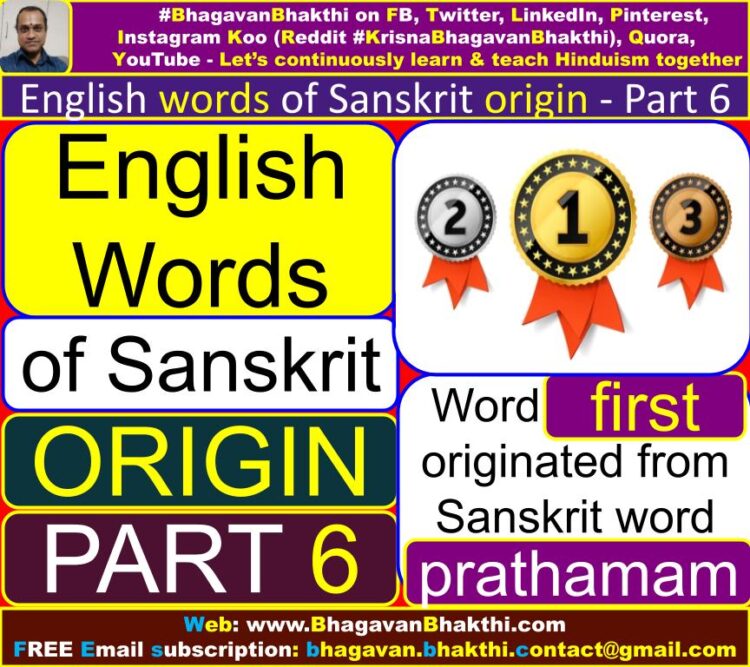
In post your will know about these : List of English words of Sanskrit origin, List of English words derived from Sanskrit, List of English words taken from Sanskrit, List of English corrupted words taken from Sanskrit, etc.
List of English words of Sanskrit origin (Part 6 of Part 7) are as given below:
Meditation / meditate : In Sanskrit many of us may be knowing about ‘mānasa / mānas’ (read as maanasa / maanasa), which means mind. Anything which is done using mānasa or mind is meditation. Means something which is done to get relaxation of mind. Very easily is could be understood that meditation is taken from the Sanskrit word mānasa.
Worship : Worship is taken from the Sanskrit word vandanam. In Sanskrit worship means ‘vandanam‘ (read as vandanaṁ). wor = van, not much of difference.
Surgery : Shastrakriya is the original word of the English word surgery. In Sanskrit surgery means ‘shastrakriya‘ (read as shastrakriya / śastrakriyā). ‘sa’ can be easily pronounced compared to ‘sha’.
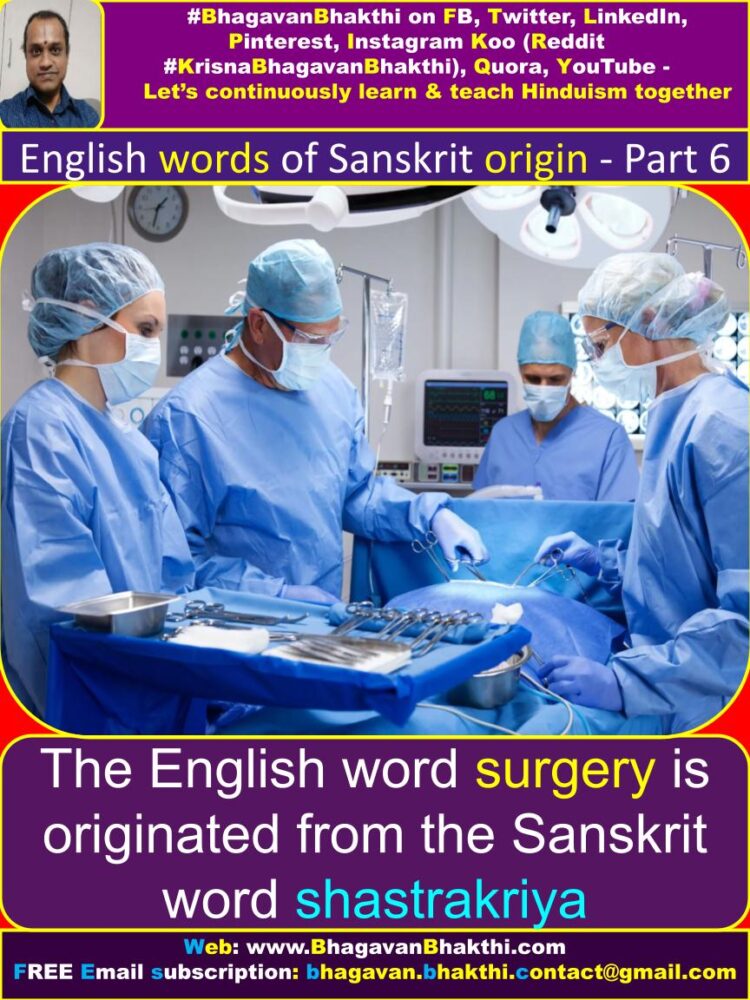
Paramour : In Sanskrit paramour means ‘pararamaNa‘ (read as pararamanha). Also paramour means ‘jAra’ in Sanskrit. Prostitute : In Sanskrit prostitute means ‘paNastri‘ (read as panhastri). Another copied word with mispronunciation.
Bicycle : In Sanskrit bicycle means ‘dvichakra‘. dvichakra = dvi + chakra = tvi (two: see two as explained earlier) + chakra = bicycle. Interest : Interest = inter + est. Here inter means something done with two or more persons’ interest and est in English means doing favour.
Similarity in Sanskrit ‘antararuchi’ means the same as interest. Inter = antara. Very clearly the English word is taken from the Sanskrit word antararuchi.
Further : In Sanskrit further means ‘parastaram (परस्तरम्)‘. Earlier we have seen many times that wherever ‘pa’ is used in Sanskrit, there ‘fa’ is been used in English.
Promote : In Sanskrit promote means ‘pracharam / prachara / prachar’. The English word when pronounced, it would be like ‘pramote’ and not promote. Clearly a mispronounced word.
Quality : In Sanskrit quality means ‘gunavatti‘. Here quality = qua + lity = guna + vatti. qua = guna. Not much difference. Only pronunciation difference. Pronounce : In Sanskrit pronounce means ‘pracarati‘ (read as pracharati). Another word in Sanskrit for pronounce is ‘uchharati’.
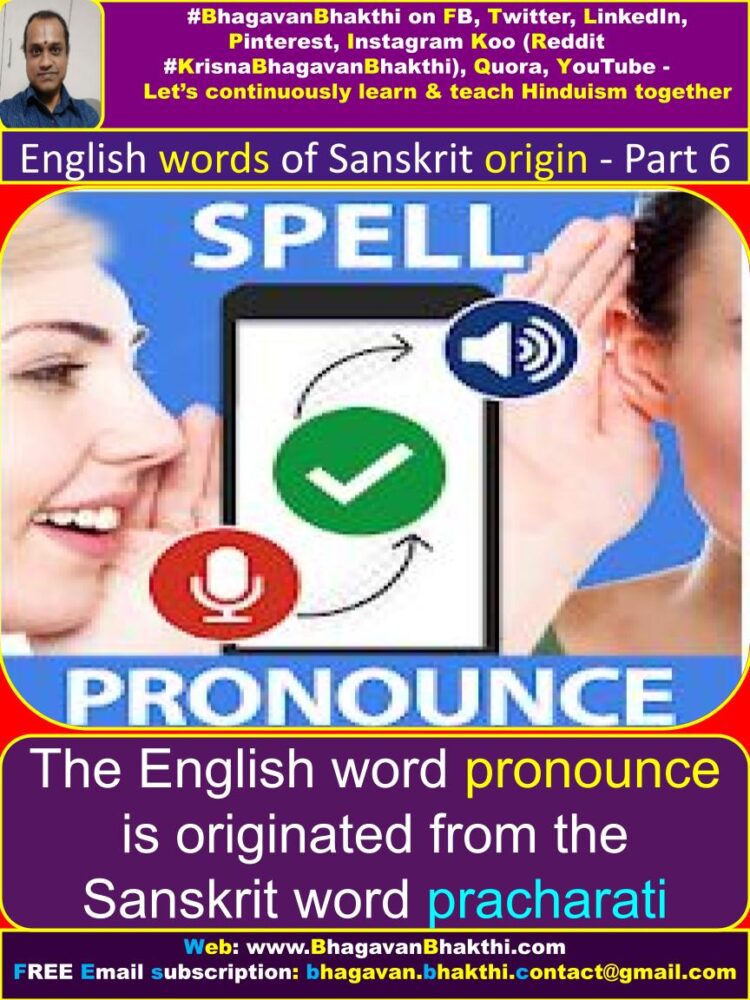
First : In Sanskrit first means ‘pratamam / pratama / pratam’. Earlier many times we have seen that Europeans use ‘fa’ instead of ‘pa’ as used in Sanskrit. If first is rewritten in Sanskrit style, it would be look like ‘fast’ (this is not English fast / speed) and not first.
Bone : One of the words in Sanskrit for bone is ‘bhAradvAja‘ (bhaaradvaaja). In Sanskrit bhAradvAja means strength or vigour. Also in Sanskrit bhAradvAja means bone. Also bhAradvAja is one of the great rishi / rushi’ in Indian Sanatana Dharma.
Craft / crafty : In Sanskrit craft means ‘kalAkruti‘ (kalAkriti) (read as kalaakruti). kalaakruti = kalaa + kruti. Very clearly the English word is a short form of the Sanskrit word.
Manual : Manual means something done by humans / man / men. Many of us know that in Sanskrit man means manushya (man is the short form of the Sanskrit word manushya). Thus something which is done by manushya (man) is manual.
All : In Sanskrit all means ‘sakala / sakal’. Here sakala = sak + ala = sak + all = all. Again here the English word ‘all’ is the short form of the Sanskrit word sakala. Cradle : In Sanskrit cry means ‘kranda‘ (which is the original word of the English word cry).
Babies are famous for crying. From the English word cry another English word cradle came into existence. And both of these English words are been taken by the Sanskrit word ‘kranda‘.
Pleasure : In Sanskrit pleasure means ‘prahalAda‘ (prahlAda) (read as prahalaada). Immense : In Sanskrit immense means ‘amitam / amita / amit’. immense = imm + ense = am + ense = amitam.
Comet : In Sanskrit comet means ‘dhUmaketu‘. Comet is the simple form of the Sanskrit word. dhUmaketu = dhUma + ketu = ketu = comet. This ketu is different from the ‘rAhu ketu’ pair.
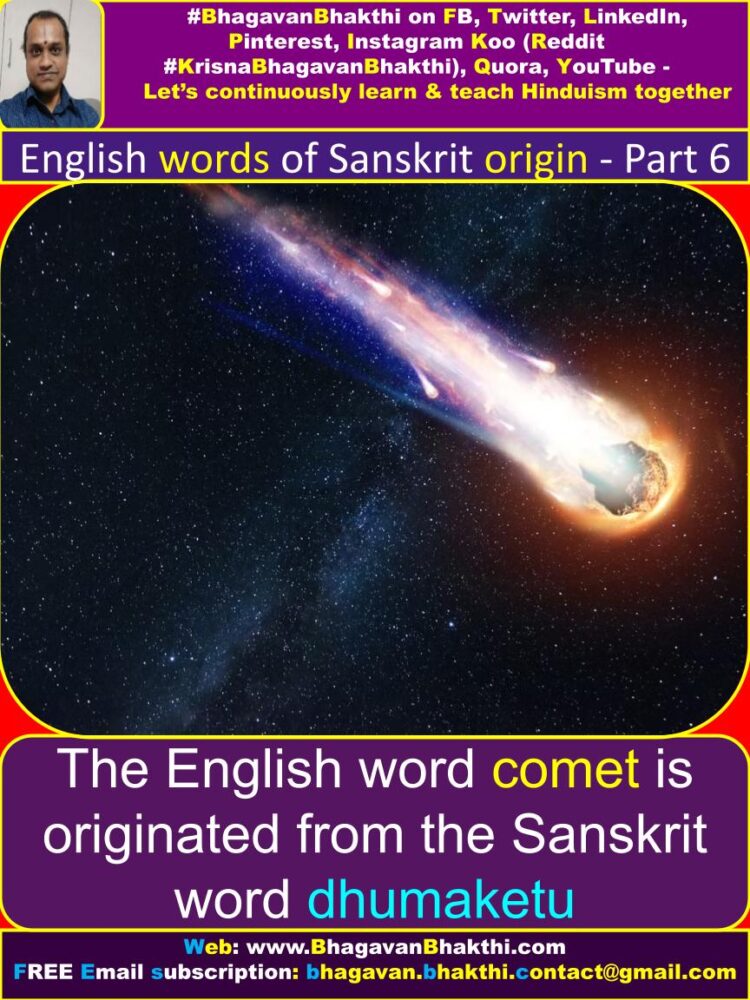
Heard / hear : In Sanskrit heard means ‘shruta‘ (श्रुत / śruta). Europeans can’t pronounce ‘shru’ easily, instead it is easy to pronounce ‘ha’. That’s the difference.
Money : In Sanskrit one of the word for money is ‘mudrA‘. Whereas ‘mudrA’ also means print. We all know money has to be printed in various forms. And this is happening since ages. Clearly a corrupted word.
Marrow (bone marrow) : In Sanskrit marrow means ‘majjA‘ (read as majjaa / मज्जा). This clearly shows Sanskrit (Sanatna Dharma) had and also have a high scientific knowledge since ages.
Growl / grunt : Both of these English words have the same meaning. In Sanskrit ‘garjana‘ means growl / grunt. Very easily both of these English words are taken from the Sanskrit word.
Rob : In Sanskrit rob means ‘ruNTati / ruNT’ (रुण्टति) (read as runhTati / runhT). At (at that place) : In Sanskrit ‘at’ means ‘atra‘. Even in Kannada it is ‘atta’, in Tamil it is ‘anga’, in Telugu it is ‘akkaDa’ etc.
Inter / internal : In Sanskrit inter / internal means ‘antara‘. Directly copied word. Badge : In Sanskrit badge means ‘padakam / padaka / padak’. Here padak = pa + dak = ba + dak = ba + dage (read as a Sanskrit word and not as an English word) = badge.
Cement (a building material) : In Sanskrit cement means ‘cUrNa‘ (चूर्ण) (read as choornha). We all know in earlier days we were using ‘cUrNa‘ to construct temples, palaces, houses etc. in India.
Even in the latest era at the place called ‘Mysuru’ in Karnataka (earlier called as mysore) there is a dam called ‘krishna rajendra wadeyar dam’ (KRS). This dam was built by using ‘cUrNa‘ by the Bharat Ratna Sir M Vishveshwaraiah.
Maker : In Sanskrit maker means ‘nirmApakam / nirmApaka / nirmApak’. Maker is a short form of the Sanskrit word. nirmaapak = nir + maapak = maapak = maker.
Sauce : In Sanskrit sauce means ‘sUpa / sUp’ (read as soopa / soop). Another misspelled word. Sour : In Sanskrit sour means ‘Shuktaka / Shuktak’ (शुक्तक). It’s easy to spell ‘sa’ than ‘sha’. That’s the difference and off course a misspelled word.
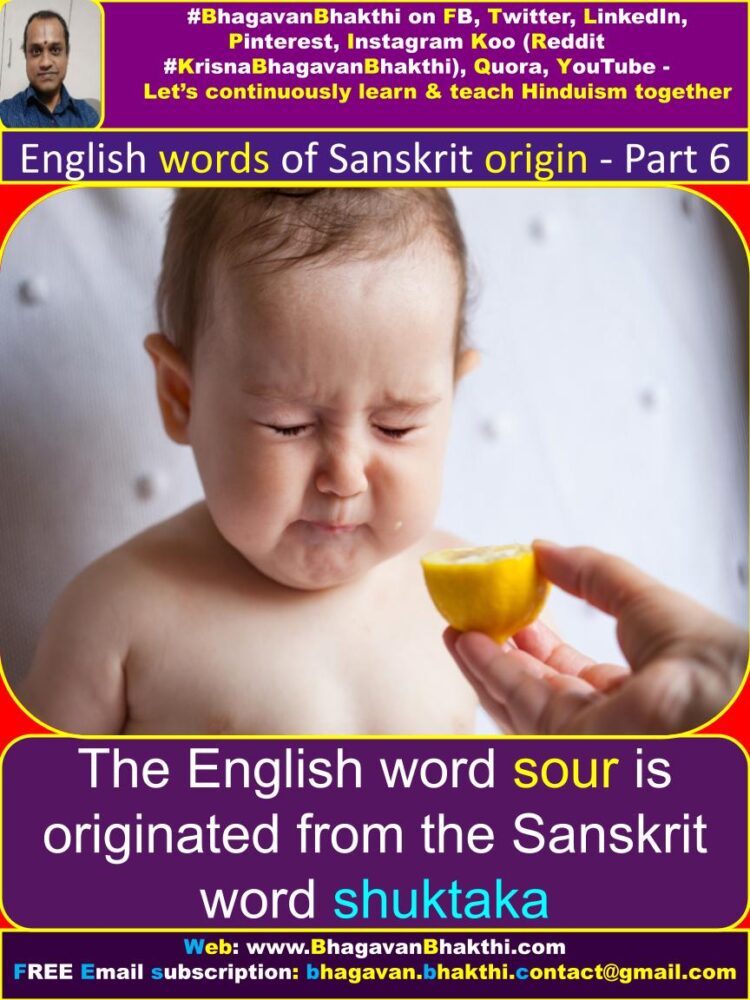
Hear : In Sanskrit hear means ‘shravanam / shravana / shravan’. It is easy to pronounce ‘ha’, than ‘shra’. That’s the secret and definitely a misspelled and copied word.
Madam / Ma’am : Both of these words are taken from the Sanskrit word ‘mAthru‘. In Sanskrit ‘mAthru’ means mother. It seems that in earlier days even in European countries women were called as mothers (madam and ma’am).
Both the words madam and ma’am are derived from the English word mother. Whereas the English word mother is derived from the Sanskrit word ‘mAthru’.
Shy : In Sanskrit shy means ‘shAlIni‘ (शालीनि (read as shaaliini). Directly copied and short form word of the Sanskrit word. Question : In Sanskrit question means ‘prashnam / prashna’. Question = ques + tion = prash + nam. ques = prash. Only change is mispronounciation and nothing else.
Avert / Averted : In Sanskrit avert / averted means ‘Avrtta‘ (आवृत्त) (read as aavrutta). Clearly a mispronounced word. Favorite / Favourite : In Sanskrit ‘priya / priyatama‘ means favorite.
Earlier many times we have seen that in Sanskrit ‘pa’ is used, while in European languages ‘fa’ is been used. Classic example is father = pithru.
Easy : In Sanskrit easy means ‘anAyAsa‘ or simply ‘asya’. Easily we can understand that the English word is a misspelled version of the great Sanskrit language.
Dependent / depend : In Sanskrit ‘adhinam / adhina / adhin’ means dependent or depend. adhinam = a + dhi + nam = dhi + nam = dhi + na + m = de + na = de + pend = depend. Again, another mispronounced word.
God : In Sanskrit God means bhagavad / bhagavan etc. Bhagavad = bha + gavad = gavad = god. God is the short form of the Sanskrit word.
Infinite / Infinity : In Sanskrit infinite / infinity means ‘anantam / ananta / anant’. ananta = an + nan + ta = in + fi + note. an = in. A mispronounced word. This is just like inter = antar, which we have seen earlier.
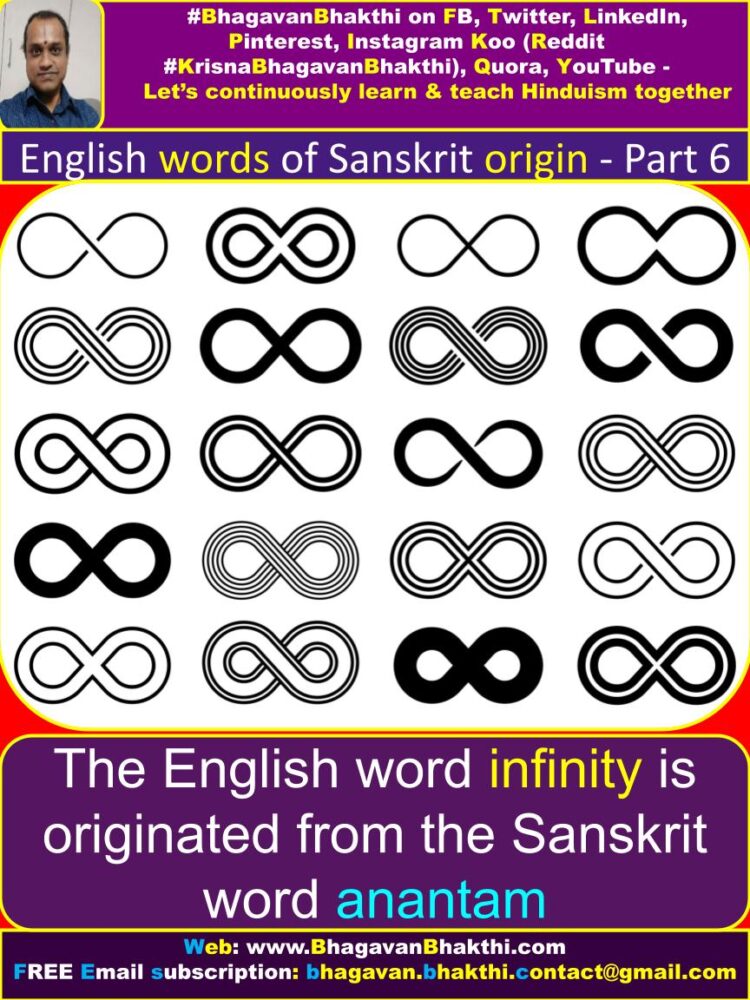
Town : In Sanskrit town means ‘paTTanam / paTTana / paTTna’. paTTana = pa + TTana = pa + TTan = pa + town = town. Here the English word is the short form and mispronounced word of the Sanskrit word.
Juice : One of the word for juice in Sanskrit is ‘piiyoosha’ (Piyusha) (पीयूष). piiyusha = pii + yusha = juisha = juice. Simple tongue twister.
Fragrance : In Sanskrit fragrance means ‘parimala / parigandha’. Many times earlier we have seen that Europeans use ‘fa’ for ‘pa’ of Sanskrit. Parigandha = pari + gandha = fari + gandha = fragrance. Another mispronounced word.
Publicity : In Sanskrit publicity means ‘prasiddhi / prachAra’. Very easily we can understand that this english word is directly taken from the Sanskrit word. Engine : In Sanskrit engine means ‘yantra‘. Look at carefully the initial part of both the Sanskrit and English words, yan = en. That’s the secret.
Engineer : In Sanskrit Engineer means ‘yantri‘. We already know that engine is taken from the Sanskrit word ‘yantra’. Somebody who works on engine is and Engineer. Similar in Sanskrit somebody who works on ‘yantra’ is called as ‘yantri’.
Pronouncing ‘tri’ is difficult, while pronouncing ‘neer’ is easier comparably. That’s the difference and the secret.
Invention : In Sanskrit invention means anveshanam / anveshana / anveshan. Invention = in + ven + tion = an + ve + shan = anveshan. As simple as that. Sanskrit is the only language of the world. Bunch : In Sanskrit bunch means ‘guccham / guccha’. bunch = gucch. Another mispronounced word.
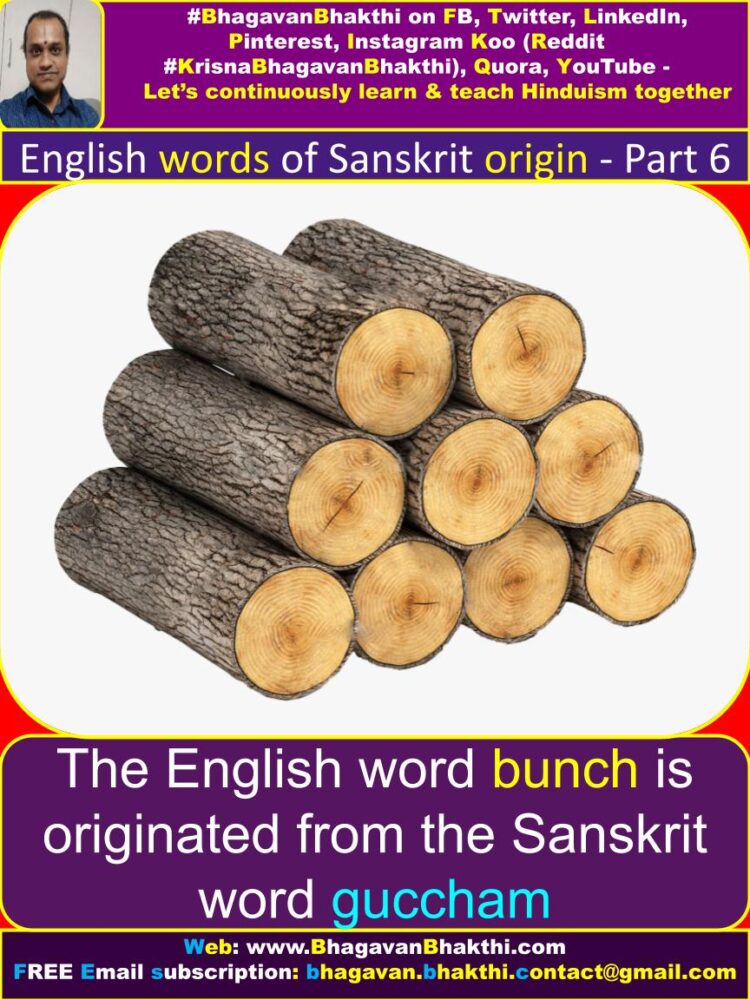
Clump (cluster) : In Sanskrit clump means ‘stamba / stamb’. Clearly a mispronounced word of the original Sanskrit word. Actor : In Sanskrit actor means ‘naTa‘ (read as naTa and not as nata). Here you can ask what is the relationship here between the Sanskrit word and the English word. Here is the hidden secret. naTa = na + Ta = a + Ta = aTa = actor.
Pronouncing just ‘a’ is much more easier than pronouncing ‘na’ (please read these words and short words as an Indian and not like an English person, than only we can understand these tricks). Another mispronounced word.
Tribe : Dictionary meaning of Tribe is ‘a hierarchy of family’. In Sanskrit ‘gotra’ means family name. This means both the Sanskrit word and the English word has the same meaning. gotra = go + tra = tra = tri + b = tribe.
Sow / sowing : This means planting. In Sanskrit plants means ‘sasya’ and sowing means ‘sasyavApin‘. Very clearly the English word is the mispronounced word of the Sanskrit word. Oyster : In Sanskrit oyster means ‘shukti‘. oys + ter = oish + ter = sha + ter = shu + ter = shuk + ti = shukti. It’s mispronunciation and due to evolution of time.
Body : In Sanskrit body means ‘vadana / badana / badan’. badan = ba + dan = bo + dan = bo + dy = body. Pronounce like an European, you will understand.
Boil : In Sanskrit boil means ‘budbudana‘. The English word is the shorter form and mispronounced of the Sanskrit word. Bubble : In Sanskrit bubble means ‘budbuda‘. Clearly a mispronounced word.
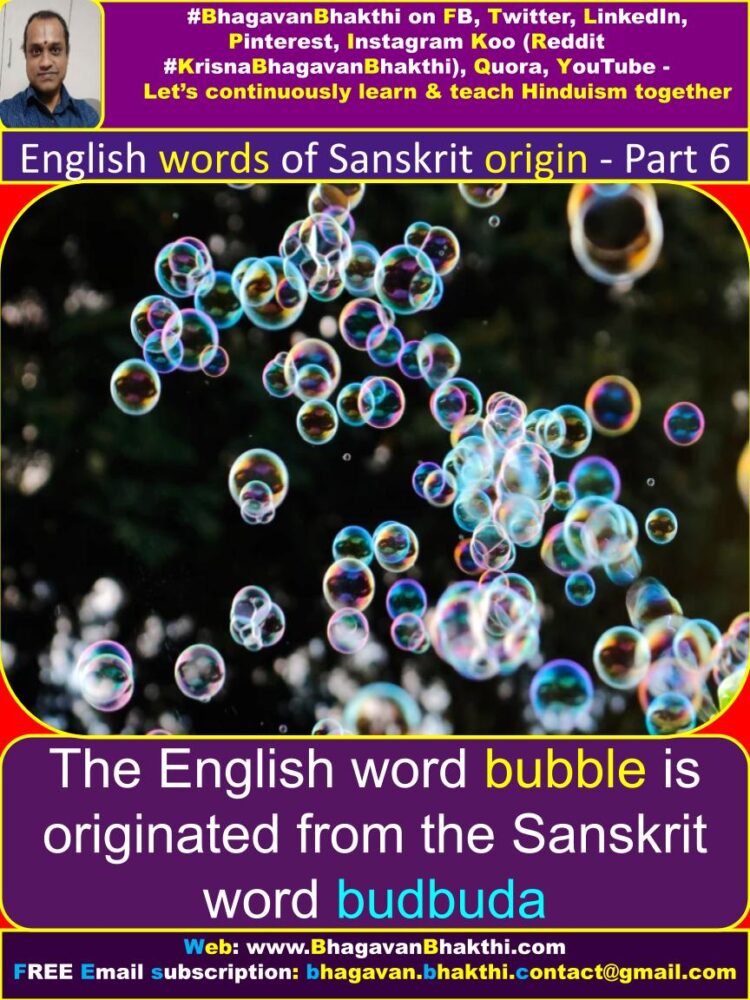
Semen : In Sanskrit semen means ‘shukrANu‘. shukrANu = shukrA + aNu = sem + en = semen. Pronouncing shukrA is very difficult, instead of just ‘sem’. Also similarity pronouncing ‘aNu’ is more difficult than just ‘en’. Very much clearly the english word is a short form and mispronounced word of the great samskruta word.
Attire : In Sanskrit attire means ‘AbharaNa / AbharaNa’ (read as aabharanha / aabharanha). aabharanh = aa + bha + ra + nh = a + bha + ra + nh = a + tta + ra + nh = atta + ra + nh = attire. A long samskruta word has been shortened and mispronounced.
Modest / modesty : In Sanskrit modest / modesty means ‘namrata‘. Namrata = nam + ra + ta. Let us pronounce modest in Sanskrit way. It would be something like modesta. Thus modesta = namrata = modest.
Gone : In Sanskrit gone means ‘gata‘. In Hindi gone means ‘gaya’. Virile : In Sanskrit virile means ‘vIrya‘. Mood : In Sanskrit mood means ‘manodazA‘ (manodasha). Very clearly the English version of word is the short form of the Sanskrit word. Manodasha = mano + dasha = manoda + sha = mood + sha = mood.
Ruby : In Sanskrit ruby means ‘kurubilva‘. Very easily we can understand that the English word ‘ruby’ is the short form of the Sanskrit word. kurubilva = ku + rubil + va = ruby.
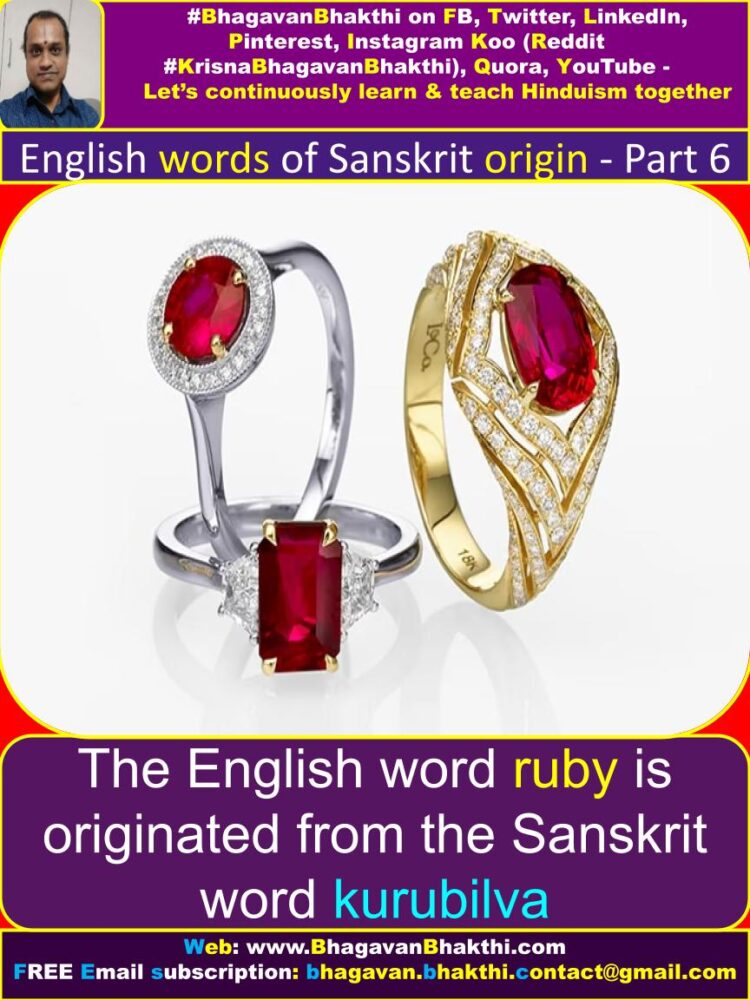
Without : In Sanskrit without means ‘vihIna‘ (vihiina). Another copied word. Et cetera (etc.) : In Sanskrit etc. means ‘itara‘. Here, notice that ‘et cetera’ = itara = it + ara. Purely corrupted word.
Intermediate : In Sanskrit intermediate means ‘antaramAdyama‘. Intermediate = inter + mediate = antara + madhyama. A copied word. Intermission : In Sanskrit intermission means ‘antaravishrAmam‘. Purely a copied word.
Interact : In Sanskrit interact means ‘antarvAd‘. Copied word. Age : In Sanskrit age means ‘yuga‘. yuga = yu + ga = age. Pronouncing ‘ga’ or ‘aga’ or ‘age’ is more simpler, than pronouncing ‘yuga’. We all know how Europeans pronounce the words like ‘BendakALUru’ as ‘Bangalore’ (now Bangalore is known as Bengaluru).
Inter-age : In Sanskrit inter-age means ‘antaryuga‘. A mispronounced word. Associate : In English associate means to get in touch with. This means to depend on someone or something. Similarly in Sanskrit ‘Ashraya‘ means depend / depended. Very clearly the English word is a corrupted word from the Sanskrit word.
Available : In Sanskrit available means ‘upalabhda‘. Watch the Sanskrit word little closely. Upalabhda = up + alabhda = up + available. Another short form and differently pronounced word the original Sanskrit word.
Super / Superior : In Sanskrit ‘shreshTa‘ means super / superior. Pronouncing ‘su’ is far easier than ‘shre’. That’s the secret.
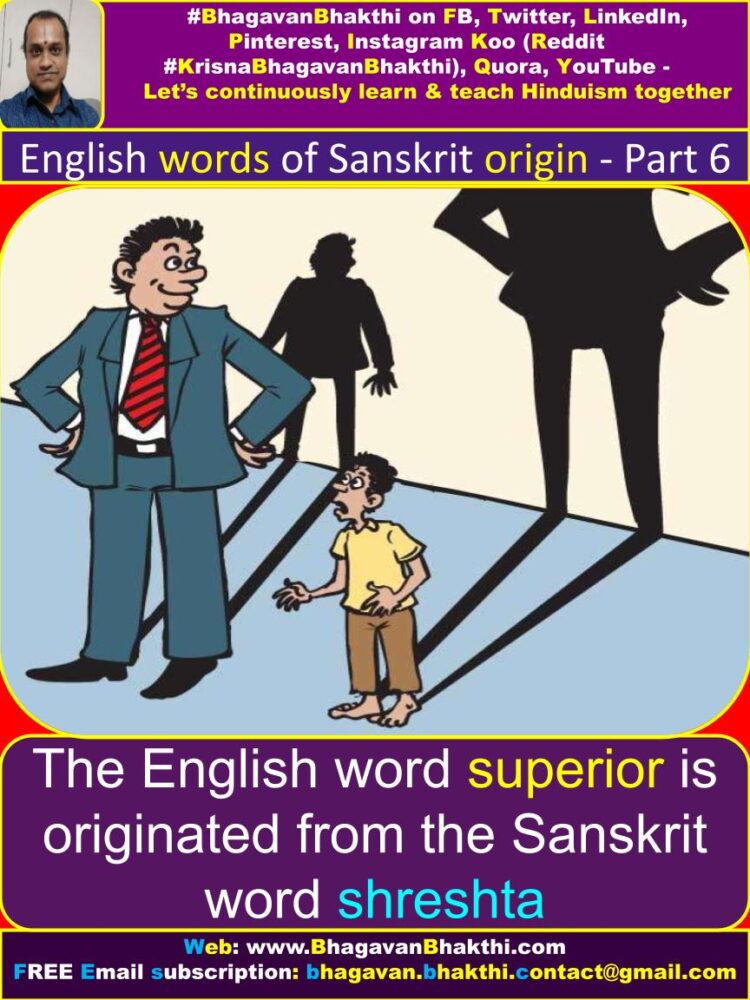
Donkey : In Sanskrit ‘dhenuka‘ means donkey. Many of us may know, there was an asura (rAkshas / demon) called ‘dhenukAsura’ who was killed by Lord Sri Krishna at his very young age.
Please : In Sanskrit please means ‘prasidati‘ (प्रसीदति) or simply ‘dayati’. prasidayati = prasi + dayati = please. Very clearly the English word is a simplified version of the Sanskrit word.
Propitiate : In Sanskrit propitiate means ‘prasidayati‘. Very clearly the English word is mispronounced word of the Sanskrit word. Also ‘prasidayati’ means please in Sanskrit.
Trust : In Sanskrit one of the word for trust is ‘pratyAshA‘ (read as pratyaashaa). pratyAshA = pra + tyAshA = pra + tyAsh + A = pra + trust + A. Very clearly we can understand that the English word is a short form of the Sanskrit word.
Chronic : The meaning of this English word means something long, which is very very long lasting. In Sanskrit ‘chirakAlam / chirakAla / chirakAl’ means something which is very very long lasting. Another corrupted word.
Tamarind : In Sanskrit tamarind means ‘tintriNI or tintiDIka‘ (read as tintriNii or tintiDiika). Another misspelled word. Acid : In Sanskrit acid means ‘amla‘. Also in Sanskrit amla means sour. A mispronounced word.
Weak : In Sanskrit one of the meaning of the word weak is ‘vishikha‘. Very easily we can understand that the English word is the short form of the Sanskrit word.
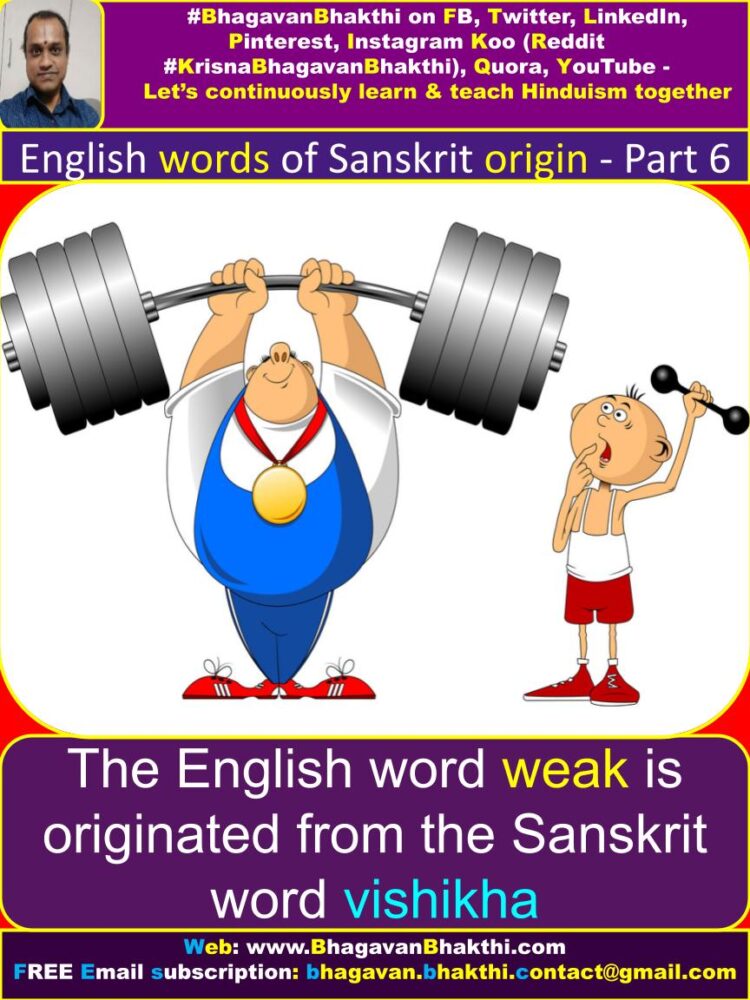
Vulva : In Sanskrit vulva means ‘yoni‘. Don’t see the spelling. Watch the pronunciation. vulva = yoni. vul = yo. Common : In Sanskrit common means ‘samAnam / samAna / samAn’. common = samaan. A misspelled word.
Dis : In English is prefix ‘dis’ is used in many words like dishonest, dishonour etc. In Sanskrit also we have a prefix called ‘duS‘ (read as dush), which is been used in multiple Sanskrit words like ‘dushTa, dushkruti’ etc. Everything is taken from the great Sanskrit language.
Petal (of flowers and trees): In Sanskrit petal means ‘pattra‘. Another corrupted word. Later : In Sanskrit later means ‘tadanantaram / anantaram / nantaram / nantara / nantar’. Now let us make some R & D here. nantar = n + antar. later = l + ater. Here ending of both the words are same when pronounced, that is, antar = ater. Yes, you got it. That’s the secret. Only pronunciation difference.
Here : In Sanskrit here means ‘atra‘. Not much difference other than pronunciation. Period : In Sanskrit period means ‘paramAvadhi‘ (read as paramaavadhi). Easily we can understand that the English word is the short form of the Sanskrit word.
Fraction : In Sanskrit one of the meaning of the English word fraction is ‘paramabhAgam / parambhAg’ (read as pramabhaagam / parambhaag). Earlier many a we have seen that ‘fa’ is been used in English words when ‘pa’ is been used in Sanskrit. Again another corrupted and mispronounced word.
Assimilate / Assemble : In Sanskrit assimilate / assemble means ‘samIkaraNa‘ (read as samiikaranha). Very easily it can be understood that the English version of the word is taken from the original Sanskrit word.
Yakult : It is a product developed by Japanese to prevent liver and digestive organs. In Sanskrit ‘yakrut’ means liver. Very clearly we can understand that Sanskrit language is everywhere.
Fat : In Sanskrit fat means ‘sphIta / sthUla‘ (read as sphiita / sthoola). sphiita = sphii + ta = phi + t = fat. Many times we have been seeing that wherever ‘pa / pha’ is used in Sanskrit, there ‘fa’ is used in English. That’s the only change.
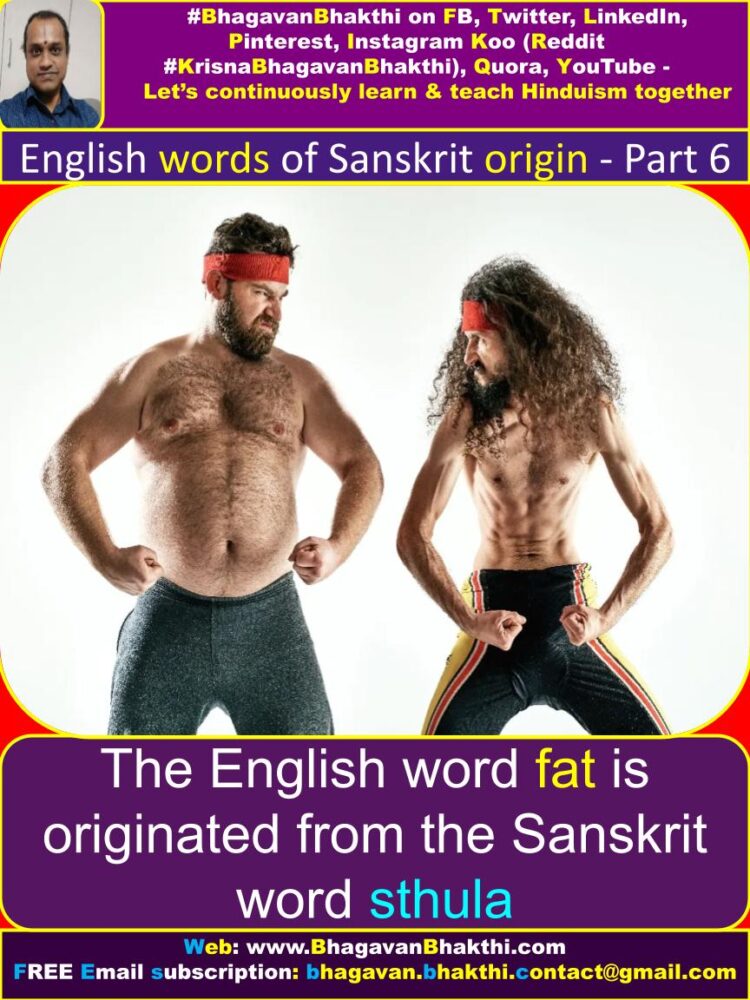
Guise : The meaning of guise is misleading appearance; cover, cloak. In Sanskrit there is a wonderful word called ‘gUDha‘ (read as gooDha). Another misleading and mispronounced word from the great Sanskrit word.
Wicked : In Sanskrit wicked means ‘viguNa‘ (read as vigunha). Watch little closely, you can understand the hidden secret. Glass : In Sanskrit glass means ‘kAcaka / kAca’ (read as kaachaka / kaacha). Let us write glass in Sanskrit language style. glass = glaasa = kaacha. Another mispronounced word and nothing else.
Video : In Sanskrit to view something is called as ‘vIkshaNa‘ (read as viikshana). Video is also part of viewing something. Thus, very clearly the English word is taken from the Sanskrit word. Mountain : In Sanskrit there is a wonderful word called ‘mandAra parvatam‘, which means a mountain.
This is the same mountain which comes into picture during the Lord Sri Vishnu’s avatar of Lord Sri Kurma. Very clearly the English word is taken from the Sanskrit word.
Square : In Sanskrit square means ‘Samabhujacatuṣkōna‘ (समभुजचतुष्कोन). Here sama + bhuja means same + ends, chatur means four and kona means side. We need to understand that Europeans can’t pronounce this type of long words easily.
Thus they would cut down the longer word into shorter word. Thus Samabhujacatuṣkōna became square. Give importance to the first and last part of the Sanskrit word.
Courtesy : In Sanskrit courtesy means ‘krupAkaroti (kripakaroti) or krutagnata (kritagnata)’. Very clearly another corrupted word.
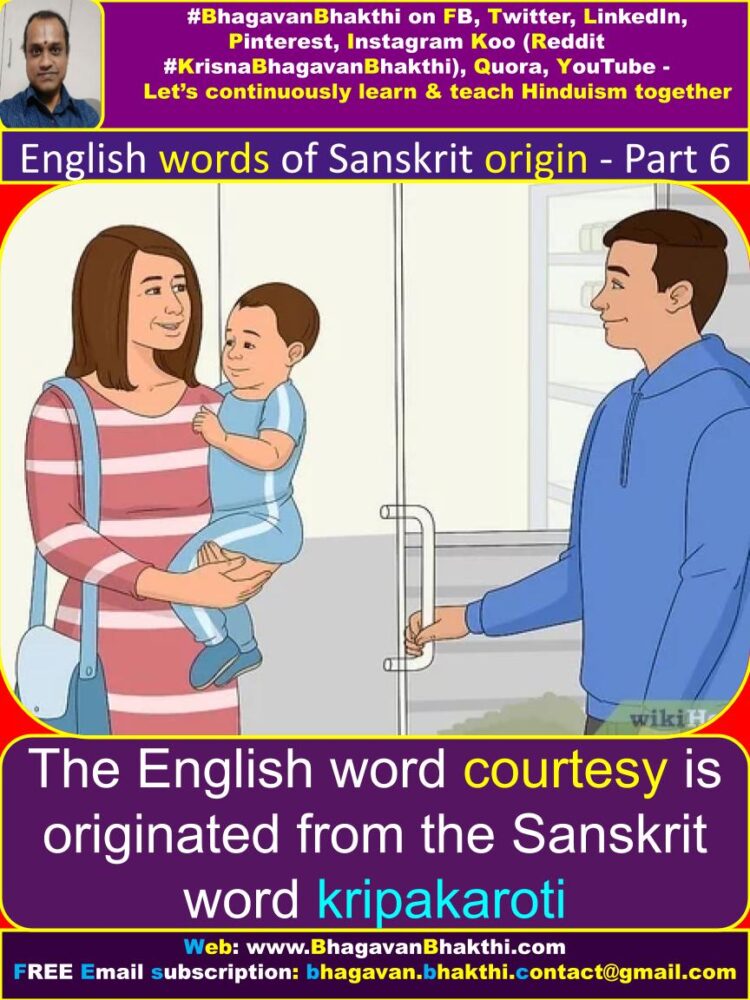
Ban : In Sanskrit ban means ‘bandha / bandh’. Even in many Indian languages this word is used. Very clearly another copied word. Safari : In Sanskrit and other Indian languages safari means ‘savAri‘. A misspelled and a copied word.
Caspian sea : This word ‘Caspian’ is taken from the Sanskrit word and name ‘Kashyapa’ (one of the Saptarishi). Orion (constellation) : The English word Orion is taken from the Sanskrit word ‘Aryan‘ (read as aaryan).
Omega : The twenty-fourth letter of the Classical and the Modern Greek alphabet, and the twenty-eighth letter of the Old and the Ancient Greek alphabet, i.e. the last letter of every Greek alphabet.
Uppercase version: Ω; lowercase: ω.The end; the final, last or ultimate in a series. I am the Alpha and the Omega, the First and the Last, the Beginning and the End.— Revelation 22:13, New International Version). In Sanskrit OM (ॐ) means first, ultimate, supreme personality, etc.
Lord Sri Krishna in Sri Bhagavad Gita say that, ‘I the start, I am the middle and I am the infinite’. Here Lord Sri Krishna says ‘I am the Omkaara / Omkara / Omkar’. That is ॐ. What more explanation one needs.
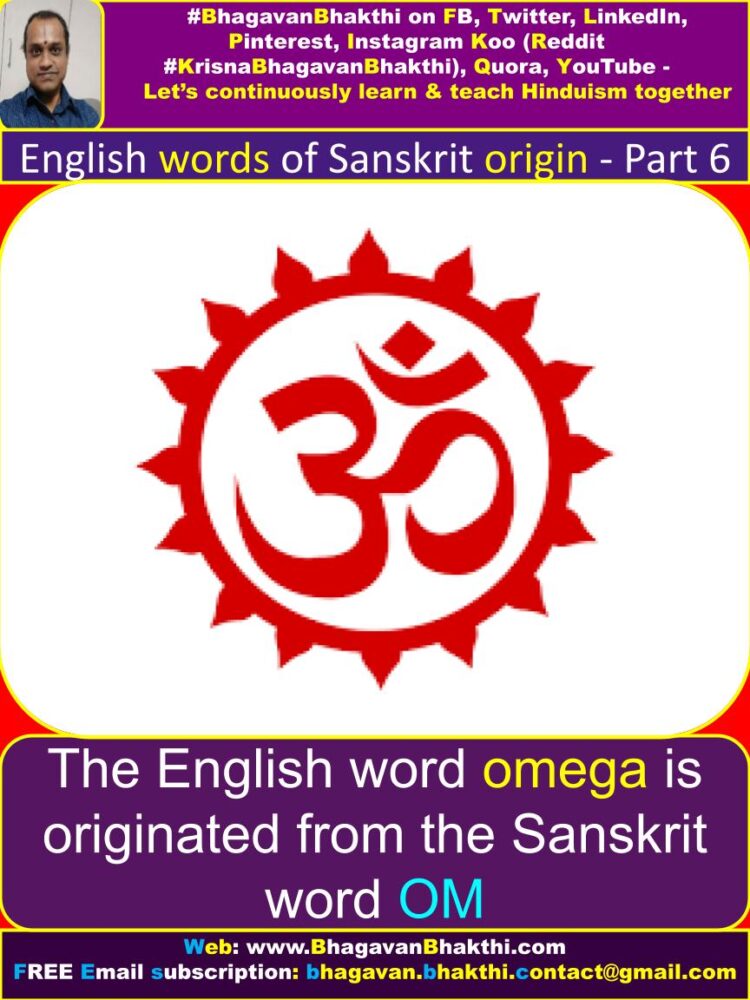
Nor : In Sanskrit many a times, we use the prefix ‘nir‘ which means no / nor. For example in the name ‘nirmala’, ‘mala’ means dirt and ‘nir’ means no / nor. The meaning of the name nirmala is, somebody who is not having the dirt. Very clearly we can understand that English word is a mispronounced word from the Sanskrit word.
Arm : In Sanskrit arm means ‘Irma / Irm’. Very clearly another corrupted word from the Sanskrit language. Another word for arm in Sanskrit is ‘bAhu’.
Mere : In Sanskrit mere means ‘mAtra‘ (read as maatra). Only difference is pronunciation. Another word for mere in Sanskrit is ‘kevalam / kevala / keval’. Portion : In Sanskrit portion means ‘pratyamsham / pratyamsha / pratyamsh’. Another copied word. Another word for portion in Sanskrit is ‘bhAga’.
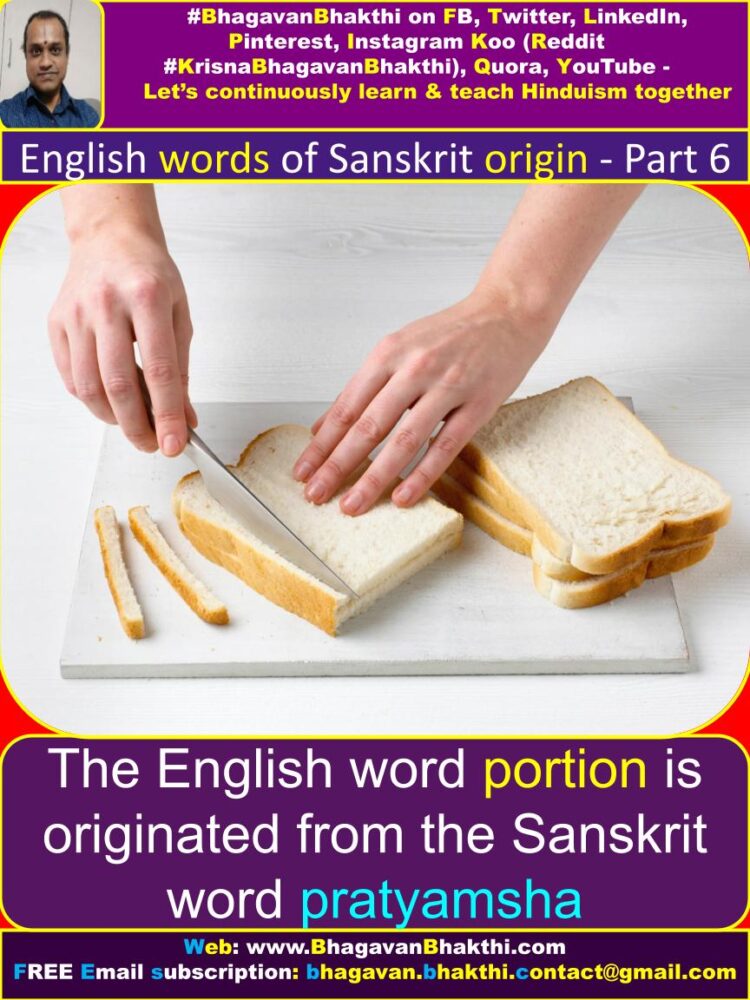
Chin : This English word originated from the Sanskrit word cīnīya (Chiniya) (चीनीय).
To watch videos on #Hinduism #Sanskrit language, SUBSCRIBE to my YouTube channel from this below link:
#BhagavanBhakthi YouTube channel
Continue reading to know about “List of English words originated from Sanskrit” from these below links:
List of English words of Sanskrit origin – Part 1 of Part 7
List of English words of Sanskrit origin – Part 2 of Part 7
List of English words of Sanskrit origin – Part 3 of Part 7
List of English words of Sanskrit origin – Part 4 of Part 7
Dear friends, if you need any clarifications about this post, kindly let me know, I will definitely try to answer all of them.
Also your one LIKE, one COMMENT, One Share, one SUBSCRIPTION is highly important.
This will help to know the quality of this content and also it will be helpful to know if any improvements is required for the content.
If you feel this content is useful to you and has helped you to improve your knowledge, kindly share this with your well-wishers.
Because “SHARING MEANS CARING”.
For receive FREE EMAIL SUBSCRIPTION about #BhagavanBhakthi, you can send an email to [email protected] from your email ID.
NAMASTE!
Sri Gurubhyo namaha
Om Sri Krishnaaya namaha
Sri Krishnaarpanamastu
Share in Social Media